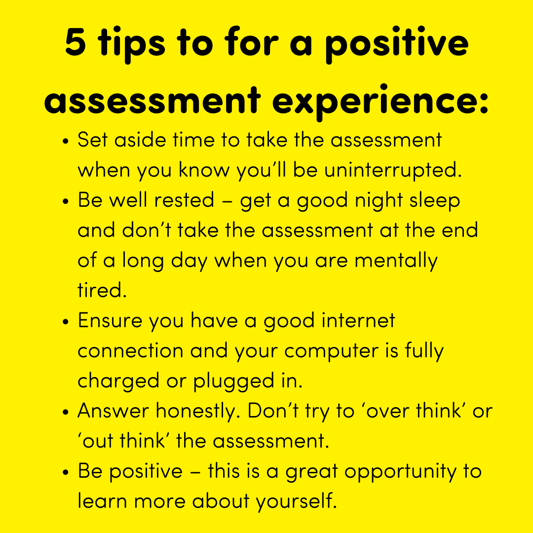As a past or current job seeker, you may have been asked to complete an assessment as part of an organization’s selection and hiring process. Traditional skill assessments, such as software testing, typing, and data entry are often done early in the process as a pre-qualifier. Talent assessments, however, are typically administered later in the process; partly due to cost to employers, but also because the candidate has been deemed to meet basic selection criteria, and now the hiring organization wants to gain insight into the candidate’s cognitive abilities and learning styles as well as behaviors, attitudes, emotional intelligence and leadership traits. As a candidate, you may be asked to participate in one or more assessments dependent on the purpose of the assessment.
Lately, talent assessments have garnered a lot of attention in response to businesses looking for more effective ways to assess their candidate shortlists. Finding the most suitable candidate for a role is an important reason for using talent assessments and the insights gained also contribute to healthier and productive employer-employee relationships as they support performance management conversations and growth and development planning.
If you have already participated in an interview and the hiring organization asks you to complete a talent assessment, here are 5 reasons why it is good news for you:
1. The employer is serious about you
When a potential employer asks you to complete a talent assessment, it typically means they are keen to know more about your skills, attributes, and behaviors as they are seriously considering you for the role. While many people believe talent assessments are used to rule candidates out, they can in fact help to validate initial positive findings during the interview and identify key strengths not yet explored.
2. The employer is looking to place you in the right setting
Businesses realize that a thriving employee is a win-win for both the company and the individual. Talent assessments can help identify behaviors and attitudes that will best align with the organization and team cultures as well as a leadership style. When you are accepted and valued by your team, are aligned and supportive of the culture, and are comfortable with your leader’s management style, you are more likely to outperform in your role. In turn, improved work performance can help you experience job satisfaction and growth in your career. Talent assessments help employers identify where a candidate may best fit within their structure and culture as they provide an understanding of your work style.
3. You get a chance to objectively learn more about yourself
When you are asked to complete a talent assessment, find out if you can receive a copy of the results so that you can learn more about yourself. The knowledge gained from assessments can help you to become more objective in assessing your natural strengths and identifying where there is an opportunity for development. Some assessments provide suggested steps to enhance or develop a skill or behavior and may also identify where you compare to the population norm. You can use this information moving forward for both personal and professional development.
Looking for more resources on job search? Check out our Career Resources.
4. You can better plan your career
You may have natural abilities in some areas that you have not yet been able to explore or tap into in your current role and uncovering what these are can help you and your employer to plan for progression and development. For example, you may not have had an opportunity yet in your career to lead a team, but your assessment results may indicate you have a strong combination of skills, attitudes, and behaviors such as managing ambiguity, resilience, and effective communication that would predict suitability for leadership. Employers can use this information to help inform their succession plans.
5. Gain insight to predict your success in a role
Just as an employer wants to make the best hiring decision, you as a candidate want to make the best decision for yourself. Employers identify skills and competencies regarded as “essential” for their roles and benchmark candidates against these criteria.
As a candidate, you too can benchmark yourself against common skill groupings for roles to help analyze and predict the likelihood of your success and enjoyment. For instance, if a role requires an ability to manage ongoing change, you would want to understand if you are naturally well-suited to make continual adjustments, able to work well with conflict, and competent at processing and applying new information quickly.
Talent assessments have become an important consideration of an employer’s hiring decision-making process as well as a resource for driving better performance and development conversations and strategies. As a candidate, you too can gain value from reviewing and understanding your results so you can make the best career decisions for yourself.



